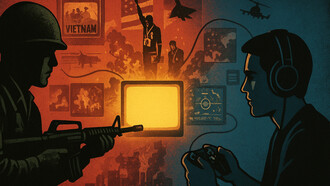Christmas is a beautiful and beloved holiday, a time when differences between peoples are overcome, at least temporarily. If only for a while! It provides a fleeting, catalytic moment that gives us a common purpose, the pursuit of peace. This is a time of and for joy. This is a season to reflect on the past and look to the future in the comfort of hope and with quiet resolution. Much of mankind can still enjoy life and celebrate Christmas and make resolutions for the New Year to change oneself or the world, while significant parts of humanity lack sufficient food and feel insecure. The anticipation of birth and of a child at Christmas is a wonderful thing.
At the same time, it unites humanity, giving us the amazing lesson that every tradition is linked to a universal value. The similarities in the Nativity story, between the Gospel and the Qur'an, reflect this truth. Despite the difficulties, I take the courage to write that they are also an inspiration for me to continue the effort to build 'bridges of understanding.' Such are the Eurasian Bridges for Peace. Eurasian Bridges became our metaphor for bilateral communication between two continents, Asia and Europe based on peace and philosophy. It unites humanity while giving us an amazing lesson that every tradition is linked to a universal value. The similarities in the Nativity story, between the Gospel and the Qur'an, reflect this truth. Despite difficulties, I take courage to write, inspired to continue building 'bridges of understanding.'
Such are the Eurasian Bridges to Peace that can heal division and promote unity in places where it is needed most. The opportunity is given once a year, a time when life's difficulties seem to be put aside. They do not cease to exist; they have simply been left behind, and they are not forgotten. We are talking about a time when hope runs high, hope is high on the agenda, our priority, without things always being easy. It is a time when people, if they do not dream, at least their dreams are postponed. We are talking about a time when the thoughts of Christmas and New Year acquire a specific meaning, reflecting peace, but this meaning is sometimes, unfortunately, changed or even altered.
At this time, much has been done that reveals the power of the holy days and perhaps leads us to a better tomorrow, the best example for humanity being Christmas Day 1914, on the Western Front. There, German and British soldiers, following the spirit of Christmas, defied the deadly orders they had received from their superiors, laid down their arms, shook hands, and exchanged gifts.
At another moment in our culture, we have to recount the famous "Christmas Carol," given to us by Charles Dickens, in his book on Scrooge, where he describes Scrooge's "visit" to an employee's house, Presence of the "Christmas Spirit": Suddenly, two little boys came running in. We smelled roasted turkey! How good! It smells good from the street! they shouted excitedly. It is a time for singing and for Marley’s ghost of nostalgic past Christmases, for the present precarious Christmas with its dilemmas, as well as for all future and uncertain Christmases. Towards the end of the story, a transformed Scrooge appears and with time ahead of him to make amends for the wrongs of his life. Who could have known that Scrooge had the potential for change? We do not know know what he will achieve, but let us take it as a good message, as a pleasant omen, telling everyone to be patient, to make another effort to change things for the better. The good is ahead; let us open a new page, with light, with color, with beauty and sweet golden hope, for a brighter future, with strong relationships and an unbreakable commitment to peace.
In his story of A Tale of Two Cities, Dickens tells us that there were better times, but also worse. It was once the age of wisdom, sometimes the age of foolishness—as ours is—and at the end of this story, the words of Sydney Carton inspire. Despite his imminent death, his life sacrificed for another Carton spends his final hours in peace, having done the right thing. That's why, as he says, "It's very much better what I'm doing now than anything I've done before; it's a much, much better rest that I'm heading towards now than all I've known before." The story in question is a "marker forward" as a French doctor who has been released from the Bastille after 18 years in prison is "recalled." And I say that there will always be Don Quixote (Don Quixotes) and his "sidekick" Pancho, and wherever there are seas, dreamers will leave marks, "drilling holes in the surface of the water.".
The words of the Apostle Paul, though "hard pressed on every side," we are not overwhelmed, and although spoken 2000 years ago, they still give us courage. "Yes," he said, "we may be confused, but we are not desperate," words useful for today.
As then, some today were persecuted but not completely abandoned, and as today, some were "silenced" then, but their message lives on. However hopeless our situation may be, despair is immensely human and has never been expressed better than in the following: "Pain, so intense that even in our sleep we cannot forget it, which falls upon the heart, drop by drop, until, in our despair and against our will, wisdom comes through the almighty grace of God" (paraphrase of verses of Aeschylus). The wisdom expressed by Aeschylus was born in war and is philosophy, which provides a road map to peace and to the recognition that war is "sweet" only for those who have not tried it.
Let us all wish Happy Holidays and Merry Years as our world continues, as gravity continues to pull it in to keep it on course, while human reason is still tied to the cosmic order and day follows night, and as this already "departing" year of 2024 gives way to the "white sheet" of 2025." Let peace prevail—stop all war. In spite of all the calamities and despair of 2024 we are hopeful that our New Year’s wish for 2025 will resonate with global vibrancy to ring in a world of peace and propagate the thought that we are on the threshold of world peace instead of being on the brink of or in wars.
But let's also remember a song by an old singer, who wonders why someone took the stone from his hands gently, held it with love, and kissed it respectfully. In this song, two persons converse, and one of them says there is no stone on earth that is not irrigated by blood; many are shed here on planet Earth, but the Earth still lives, still breathes. Our land still lives. But still the sign No room at the Inn is still in place, for far too many.















